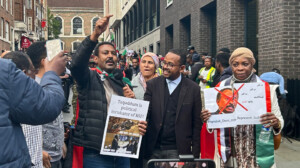Kassala gov appoints three women as directors of ministries
Security forces closed El Gash bridge in Kassala in anticipation of protests following the governor’s replacement of a number of heads of state ministries on Friday.
 Emergency medical supplies are delivered to Kassala hospital on September 2, vital supplies after violent clashes in the region (ICRC)
Emergency medical supplies are delivered to Kassala hospital on September 2, vital supplies after violent clashes in the region (ICRC)
Security forces closed El Gash bridge in Kassala in anticipation of protests following the governor’s replacement of a number of heads of state ministries on Friday.
All traffic was prevented from crossing the bridge over El Gash river, that connects the eastern and western parts of the town and the government’s secretariat buildings.
The closure came after Governor of Kassala, Saleh Ammar, dismissed the directors of three ministries, affiliated with the former Al Bashir regime, and appointed three new directors, all women.
Mousa Osheik, Director of the Kassala Ministry of Finance and Human Resources, was replaced by Shadia Ahmed, Abdallah Nafeed, Director of the Ministry of Production and Economic Resources, by Emtisal Taha, and Idris Hasan, Director of the Ministry of Infrastructure and Urban Development, by Basmat Saadouk.
After clashes erupted in Kassala on August 25 between members of eastern Sudanese tribes, in which a man was killed, the acting governor of Kassala imposed a comprehensive curfew in the town for a period of three days.
The next day, thousands of residents of Kassala and surrounding villages ignored the curfew imposed on the town, and took to the streets, demanding the speedy arrival of Governor Saleh Ammar to the state. A man was killed and others were wounded in an ethnically-motivated attack in one of Kassala’s residential districts.
The clashes were triggered by the recent appointment of Saleh Ammar as new, civilian governor. Ammar, who has a military background, belongs to the Beni Amer tribe. The leaders of the Beja tribe categorically reject his appointment.
Radio Dabanga’s editorial independence means that we can continue to provide factual updates about political developments to Sudanese and international actors, educate people about how to avoid outbreaks of infectious diseases, and provide a window to the world for those in all corners of Sudan. Support Radio Dabanga for as little as €2.50, the equivalent of a cup of coffee.












 and then
and then